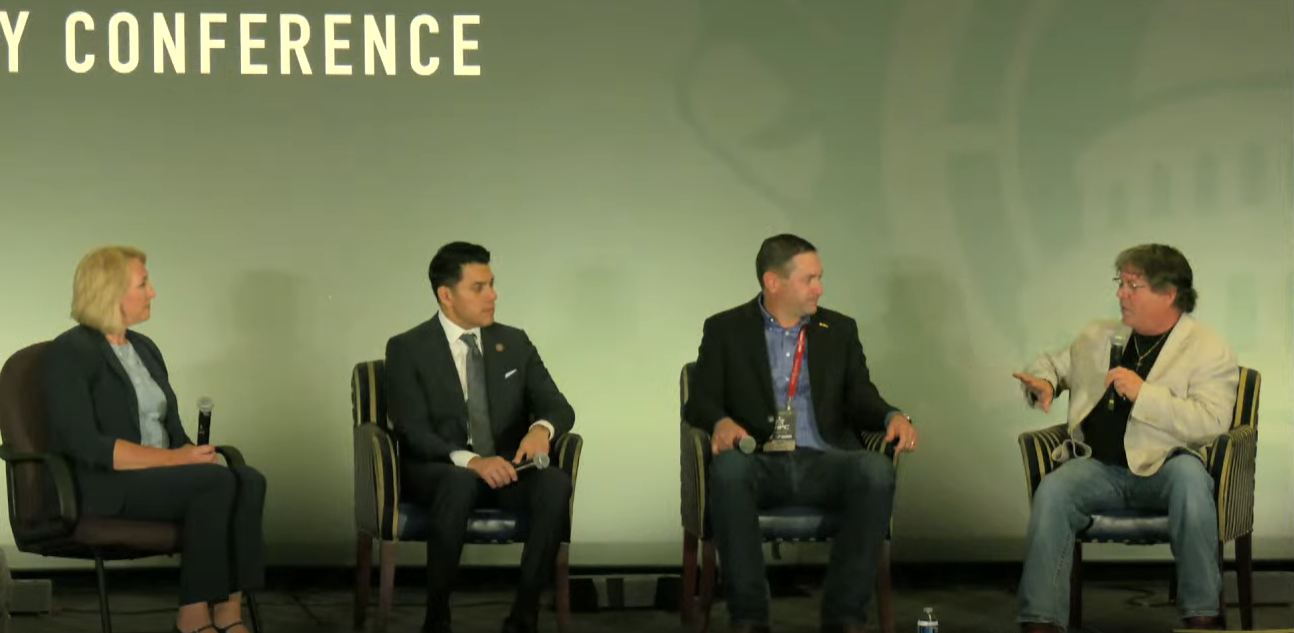
By Dave Workman
“Freedom takes work.”
So said Arizona House Speaker Steve Montenegro, one of three panelists involved in the second annual “fireside chat” at the Gun Rights Policy Conference over the weekend in Salt Lake City.
The half-hour discussion, hosted by radio personality Mark Walters, focused on what grassroots activists can do in their states to protect their Second Amendment rights. Montenegro and his fellow panelists—Montana Attorney General Austin Knudsen and Utah House Majority Whip Karianne Lisonbee—stressed the need to be involved.
Knudsen, who has led other states in filing pro-Second Amendment amicus briefs with the federal courts in some important cases, said there is an object lesson in the re-election of Donald Trump after four years of Joe Biden. After noting his office sued Biden 61 times during his administration, there was a sea change of policy when Trump returned to the Oval Office.
However, Knudsen cautioned that gun owners have to be prepared for a shift back in the other direction.
“We have to cognizant of the fact this could all change again,” he warned.
Montenegro concurred, noting that in Arizona in the past legislative session, there were 90 anti-gun bills filed, including measures to repeal “Stand Your Ground,” and adopt a waiting period on gun purchases, and another measure which would have allowed someone to voluntarily surrender their Second Amendment rights.
“In Arizona,” he said, “it’s a constant struggle…You’re never going to be left alone.”
In Utah, Lisonbee also reminded the audience that “The price of liberty is eternal vigilance.”
She said every time there is a violent incident involving guns, including the recent assassination of conservative activist Charlie Kirk, founder of Turing Point USA, “We get a ton of email asking ‘Now will you enact gun control?’” However, gun owners don’t seem to send as many messages encouraging lawmakers to keep protecting Second Amendment rights.
“That’s your part,” she said. “That’s where you come in.”
Lisonbee encouraged gun rights activists to learn about different Internet platforms so they can quickly communicate with state lawmakers. She also reminded the audience there are “good people” fighting to protect their rights in blue states.
“We may not win in the Legislature, but we can always push back,” she said.
In another exchange, Knudsen acknowledged he has led coalitions of state attorneys general because “when we can partner with groups like the Second Amendment Foundation and other states,” it can make a much bigger impression in the courts.
State attorneys general have the ability to sue the federal government. Knudsen has already demonstrated his willingness to do so. He also said using amicus briefs is a way to support court cases where plaintiffs may not have been able to touch on relevant issues within the specific word count of a complaint, so attorneys general can fill that need.
Montenegro acknowledged that even in Arizona, lawmakers frequently are threatened for taking stands.
He also said the most attention-getting communications with elected officials is a short, personal note. These stand out from typical form letters produced by advocate groups, and lawmakers will see such messages and pay attention. About the form letters, he observed, “If you don’t have time to write me (a personal) email, why should I take the time to read (form letters)?”
Above all, he agreed with fellow panelists about the importance of personal communication with elected representatives, and keeping an eye on legislation which might have a personal impact on their daily lives.
“These are the people that we want to hear from,” Montenegro said. “We want to hear from folks that are paying attention and that know how this particular policy is going to affect them. That’s something that will stop a legislator right there.”